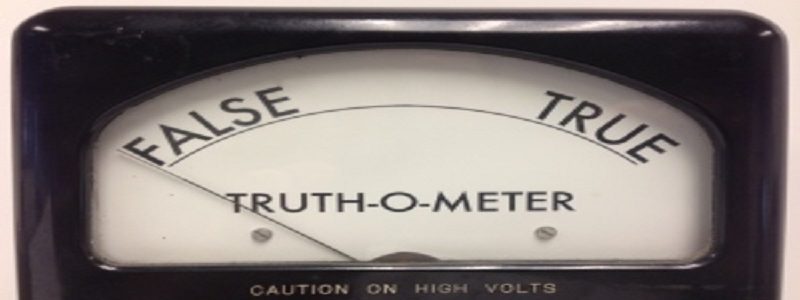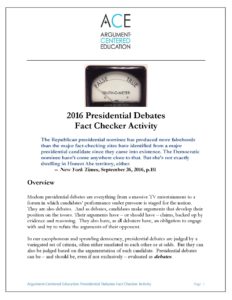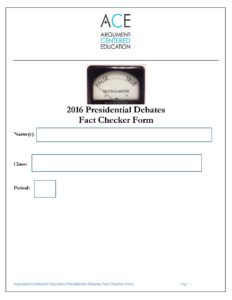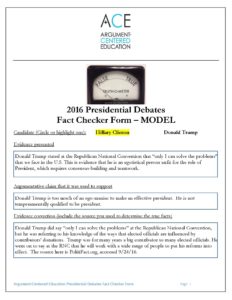
Fact Checking Evidence in the 2016 Presidential Debates
The Republican presidential nominee has produced more falsehoods than the major fact-checking sites have identified from a major presidential candidate since they came into existence. The Democratic nominee hasn’t come anywhere close to that. But she’s not exactly dwelling in Honest Abe territory, either.
— New York Times, September 26, 2016, p.B1
Overview
Modern presidential debates are everything from a massive TV entertainment to a forum in which candidates’ performance under pressure is staged for the nation. They are also debates. And as debates, candidates make arguments that develop their position on the issues. Their arguments have – or should have – claims, backed up by evidence and reasoning. They also have, as all debaters have, an obligation to engage with and try to refute the arguments of their opponent.
In our cacophonous and sprawling democracy, presidential debates are judged by a variegated set of criteria, often either unrelated to each other or at odds. But they can also be judged based on the argumentation of each candidate. Presidential debates can be – and should be, even if not exclusively – evaluated as debates.
There has been a great deal of ferment in the media, among analysts and commentators, and within both campaigns, about what from an argument-centered position is called evidence. As the New York Times and many other outlets have made plain, this year’s presidential candidates have often played very fast and loose with the truth, Trump likely more than Clinton. Evidence, though, is expected to be fact-based, objective, truthful. Reasoning interprets the objective reality recounted in an argument’s evidence, and as such introduces the subjective thinking of the speaker or writer. The closer that thinking can hew to logic and rationality, the stronger it is as an analysis as to how the evidence proves the claim is true.
But evidence itself should be – and is expected to be – factual. In academic debating, evidence is sourced: the writer or speaker is required to cite the source of the information or quotation in the evidence. Electoral debating doesn’t have this same norm. But all evidence in argument should be fact-based, and in this way electoral debates are no different from academic debates.
Much of the angst surrounding the public discussion about evidence in the presidential debates is related to this question of its facticity. How do we maintain a standard that evidence used to support argumentative claims in a presidential debate has to be fact-based? One answer is the moderator. A bevy of journalists have been stepping forward to argue that the debate moderator has at least some responsibility to call out evidence that is contrary to fact.
There is some truth to this – the moderator is a journalist, and journalists in this country since Jerffersonian times have been tasked with holding elected officials accountable for their words and deeds – but moderators are only going to have a small role to play, practically speaking, to uphold a fact-based standard of evidence in debates. They have a lot else that they have to do, and they will always be afraid of becoming the story, rather than the debaters, and rightly so.
The bigger role in upholding the facticity of evidence is the candidates’ themselves. This is, to repeat, a debate. The debaters should be do the debating. Good debating includes questioning and critiquing the opponent’s evidence. The New York Times called this “hockey goal-tending against errant evidence pucks,” but this analogy is itself misaligned and simply unnecessary. Debaters critique their opponent’s evidence. It’s what they do. In an electoral debate, where the standards for sourcing and evidence credibility are up in the air, the work of critiquing evidence is, perhaps, more difficult than in academic debates where those standards are more rules-based and officially established. But that just means that the candidates have to be more effective communicators of those standards. The job is more complicated, but the role and its requirements are the same.
However, there is a new internet-engendered agent in the quest to require that presidential debaters produce fact-based evidence. This new agent is the fact-checking website, like PolitFact and FactCheck, along with fact-checking divisions of news sites, like those from the Washington Post and CNN. Fact checking is an expression of the internet’s propensity to democratize, and it might offer a substantial breakthrough in the public’s efforts and interest in upholding the objectivity of evidence offered to support arguments made by candidates for the highest office.
This activity activates students to become fact checkers to correct evidence produced by either candidate in the 2016 presidential election debates. Students will observe and annotate closely the debates, and identify three instances of inaccurate or unfactual evidence used by either candidate to support their arguments. They will research the correct, fact-based version of the evidence, and then they will analyze the implications of the fact-checked correction in evidence on the debate on the issue within which the argumentation is contextualized. In making our students evidence fact-checkers, we are teaching them how evidence should be used in argumentation, and how facticity can and should impact a debate on the very biggest stage our democracy has built for debate.
Method and Procedure
The method and procedure for this activity are fairly simple, though no less academically demanding for that.

(1)
Students should be required to watch the 2016 Presidential Debate (whether the first on 9/26, or the second on 10/9, or the third on 10/19. They should take notes in particular on the evidence used by each of the candidates to support their claims in the debate. Note that evidence can be used in arguments or in counter-arguments against the opponent’s arguments.
(2)
The class should then conduct a teacher-led discussion of the issues that were disputed most intensively in the debate. The teacher should define terms that may be unclear and should explore more detail in the issues being debated, as appropriate.
(3)
The teacher should distribute the Fact Checker Form to all students. The teacher should also review the Fact Checker Form Model for students, providing explication of each field.


(4)
The debate should then be screened again, with every student taking notes listing out the top 6 – 8 pieces of evidence that may not be accurate. The debate should be screened continuously, but can be stopped judiciously by the teacher if explication or clarification is required.
(5)
Students should then be directed to fact checking websites like FactCheck and PolitiFact, as well as the fact-checking divisions of major news sites, like CNN and The Washington Post. They should complete their Fact Checker Form, picking out the top three most significant examples of unfactual evidence produced by either candidate. It is important that students then analyze the implications of the fact-checked evidence on the argumentation on the issue within which the correction is contextualized.
(6)
The teacher should then guide a discussion on the most important fact checking performed in light of this debate. Students should be asked to share out their most significant fact-checking discovery, along with its implications. The teacher should ask for response or critique after each share-out, and should lead a broader discussion after everyone has had a chance to offer up their findings for the class.
(7)
Each student should turn in their Fact Checker Form for assessment and feedback.

